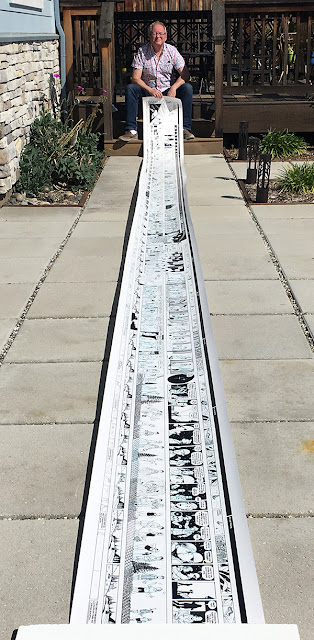Here's a question I get asked from time to time, and so try to answer from time to time.
A neighbor wants to write a book. Her grandchild has been diagnosed with a disease, and she'd like to write a book about dealing with it as a family. That sounds nice! She's already done some research on similar books, and asked me for advice on getting hers published. Here (with some revisions) is what I replied:
I love the idea for your book. Getting published is a hard thing! You're already ahead of my first piece of advice, which is to put together a list of publishers who have done similar books.
Step Two is to go online and see what those publishers' submission policies are. Many of them post them on their websites, and will tell you what they want to see in a book proposal. Give them exactly what they ask for.
You may find that many (or most or all) of them won't accept proposals without an agent. If that's the case, you may need to get an agent, and I don't have experience with that. I don't have one (graphic novels are one little niche of the publishing world where they aren't entirely necessary). But I know it involves sending your proposal to a lot of agents and hoping one wants to take it on, and my advice for that is similar: you want to find agents that represent books that are kind of like yours and look up their submission policies!
One of the things I really hate about publishing is how many gatekeepers stand in your way.
You may find it better and easier to self-publish. The advantage is that you have all the control and keep all the money. The disadvantage is that publishers know how to promote books, can get them into Barnes & Noble, and have warehouses to store them. You could also do print-on-demand, where books are only produced when they're ordered, so you don't need to have boxes of them in your garage. And of course there's digital, which needs no printing, paper, or storage at all!
There used to be a stigma against self-published books but these days they look as professional and are about as respected as any other, and there have been a lot of very successful self-published books. I don't know much about self-publishing and can't advise you how to get it done.
HERE'S WHAT I RECOMMEND:
Look up publishers' submission policies.
If you find some that will accept proposals without an agent, put together a proposal and send it to those.
If ALL of them require an agent, then decide if you want to try to find one, or look into self-publishing.
If the submission policies don't specify what should be in your book proposal, I suggest that it comprise a one-page cover letter, the first chapter or a big chunk of the book fully written, and an outline of the rest. Nobody cares about a great idea. You need to send them something complete to prove that you can write and give them a taste of your style. If it's a short book, go ahead and write the whole thing.
The cover letter should explain why the potential market for your book is HUGE! Say something like, "In the United States, X million children under the age of 5 are diagnosed with this disease every year. This book will be unique because . . ." The bottom line is that a publisher cares less what a book is about than how many copies they can sell, so approach them from that business perspective.
ALSO, look out for scams! You may find people who will offer to read your book, give you feedback, and promise you publication if you just pay them $1000. No legitimate publisher or agent will make you pay them to look at your book! Now if you go the self-publishing route, you'll of course have to pay something to set your book up to do that. You'd also be smart to hire an editor. I have no idea how much that costs.
You're trying to do a hard thing, but it sounds like it could be worth it to me! I think you have a good and important story to tell.
Good luck!
BACK TO ME in the present:
I'm always careful to explain that, although I've had four books published (and am working on more!), I'm looking at the publishing world through a tiny window. My experience is limited to one publisher and one type of book: graphic novels. However, I have a lot of writer friends, we talk shop, and I don't think I'm too off-base here.
The real bottom line is: If you want to write a book, then sit down and write it. Write it as good as you can, then start showing it to people. If you get that far, you'll be ahead of about 95 percent of everyone else who has a great idea for a book but never puts it to paper (or electrons). Every author I know has a different and unique story of how they "made it." You'll figure it out as you go.


